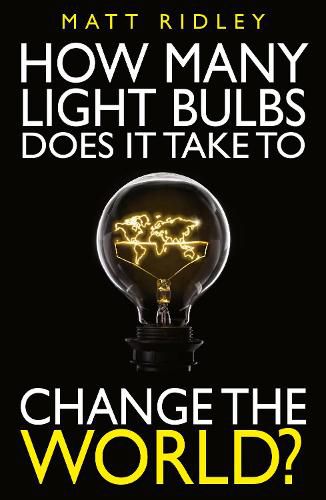Readings Newsletter
Become a Readings Member to make your shopping experience even easier.
Sign in or sign up for free!
You’re not far away from qualifying for FREE standard shipping within Australia
You’ve qualified for FREE standard shipping within Australia
The cart is loading…






Almost every schoolchild learns that Thomas Edison invented the light bulb. But did he? And if he hadn’t invented it, would we be still living in the dark? Acclaimed author Matt Ridley (The Rational Optimist, The Evolution of Everything) explains that at least 20 other people can lay claim to this breakthrough moment. Ridley argues that the light bulb emerged from the combined technologies and accumulated knowledge of the day - it was bound to emerge sooner or later. Based on his 2018 Hayek Memorial Lecture, Ridley contends that innovation - from invention through to development and commercialisation - is the most important unsolved problem in all of human society. We rely on it - but we do not fully understand it, we cannot predict it and we cannot direct it. In How Many Light Bulbs Does It Take to Change the World? Ridley examines the nature of innovation - and how people often fear its consequences. He dispels the myth that automation destroys jobs - and demonstrates how innovation leads to economic growth. And he argues that intellectual property rights, originally intended to encourage innovation, are now being used by big business to defend their monopolies. Ridley concludes that innovation is a mysterious and under-appreciated process that we discuss too rarely, hamper too much and value too little.
$9.00 standard shipping within Australia
FREE standard shipping within Australia for orders over $100.00
Express & International shipping calculated at checkout
Almost every schoolchild learns that Thomas Edison invented the light bulb. But did he? And if he hadn’t invented it, would we be still living in the dark? Acclaimed author Matt Ridley (The Rational Optimist, The Evolution of Everything) explains that at least 20 other people can lay claim to this breakthrough moment. Ridley argues that the light bulb emerged from the combined technologies and accumulated knowledge of the day - it was bound to emerge sooner or later. Based on his 2018 Hayek Memorial Lecture, Ridley contends that innovation - from invention through to development and commercialisation - is the most important unsolved problem in all of human society. We rely on it - but we do not fully understand it, we cannot predict it and we cannot direct it. In How Many Light Bulbs Does It Take to Change the World? Ridley examines the nature of innovation - and how people often fear its consequences. He dispels the myth that automation destroys jobs - and demonstrates how innovation leads to economic growth. And he argues that intellectual property rights, originally intended to encourage innovation, are now being used by big business to defend their monopolies. Ridley concludes that innovation is a mysterious and under-appreciated process that we discuss too rarely, hamper too much and value too little.